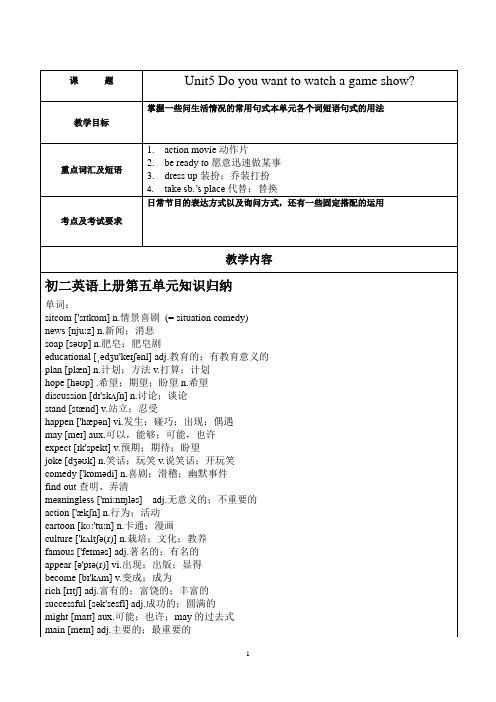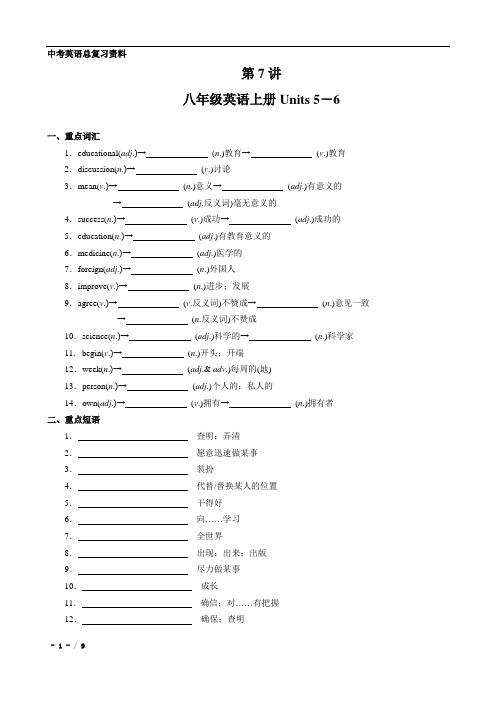人教版初中英语八年级上册Units 5-6知识梳理
- 格式:ppt
- 大小:1.62 MB
- 文档页数:16

·基本用法若要询问别人计划干什么时,通常用What do you plan to?,如:— What do you plan to do tonight?今晚你计划干什么?— I plan to do my English homework.我计划做英语作业。
— Do you plan to watch The Same Song?你计划观看《同一首歌》节目吗?— Yes, I hope to watch it, but I also want to watch the news.是的,我希望看这个节目,但我也想看新闻。
课题Unit 6 I’m going to stud y computer science.教学目标掌握将来时的运用以及复习本单元各个词短语句式的用法重点词汇及短语1、be going to+动词原形打算做某事2、practice doing sth练习做某事3、keep on doing sth.不断地做某事4、learn to do sth.学会做某事考点及考试要求日常节目的表达方式以及询问方式,还有一些固定搭配的运用教学内容知识点归纳:1. I want to be a computer programmer.我想要成为一名电脑程序设计师【解析】program n 节目→ programmer—My favorite TV _______ is A Bite of Chinese (舌尖上的中国).—We like it, too. My mother often cooks delicious food after watching it.A. instructionB.guidebookC. entertainmentD. program Programmer n.程序员;程序器;节目编排者=programer(英).The programmer come up with a solution to the system problem. 程序员想出了一个解决系统问题的办法。

Unit5 Do you want to watch a game show?重要知识点讲解Section A_Grammar Focus_Section B_综合Section A一、不同程度的喜欢的表达[点拨]love 热爱like 喜欢don't mind 不介意(无所谓)don't like 不喜欢can't stand 无法忍受Grammar Focus一、询问对方是否想要做某事的句型-Do you want to watch the news?你想看新闻吗?-Yes,I do.是的。
[点拨]"Do you want to+动词原形+某事?"用于询问对方是否想要做某事。
是一个一般疑问句,该句的回答:(肯定)Yes,I do.(否定)No,I don't.二、询问对方在未来某时间的计划是什么的句型-What do you plan to watch tonight?你今晚想去看什么?-I paln to watch Days of Our Past.我想去看《我们过去的时光》。
[点拨]"What do you paln to+动词原形+将来时间?"用于询问对方在未来某时间的计划是什么。
该句的回答:I plan to+动词原形+某事.三、询问对方期望能从某事中学到什么的句型-What can you expect to learn from sitcomes?你期望从情景剧中学到什么?-I can learn some great jokes.我能学到一些很好的笑话。
[点拨]"What can you expect to learn from+某事?"用于询问对方期望能从某事中学到什么。
该句的回答:I can learn+...四、询问对方喜欢做某事的原因的句型-Why do you like watching the news?你为什么喜欢看新闻呢?-Because I hope to find out what's going on around the world.因为我想了解世界各地发生了什么事情。

中考英语总复习资料第7讲八年级英语上册Units 5-6一、重点词汇1.educational(adj.)→(n.)教育→(v.)教育2.discussion(n.)→(v.)讨论3.mean(v.)→(n.)意义→(adj.)有意义的→(adj.反义词)毫无意义的4.success(n.)→(v.)成功→(adj.)成功的5.education(n.)→(adj.)有教育意义的6.medicine(n.)→(adj.)医学的7.foreign(adj.)→(n.)外国人8.improve(v.)→(n.)进步;发展9.agree(v.)→(v.反义词)不赞成→(n.)意见一致→(n.反义词)不赞成10.science(n.)→(adj.)科学的→(n.)科学家11.begin(v.)→(n.)开头;开端12.week(n.)→(adj.& adv.)每周的(地)13.person(n.)→(adj.)个人的;私人的14.own(adj.)→(v.)拥有→(n.)拥有者二、重点短语1.查明;弄清2.愿意迅速做某事3.装扮4.代替/替换某人的位置5.干得好6.向……学习7.全世界8.出现;出来;出版9.尽力做某事10.成长11.确信;对……有把握12.确保;查明13.能够14.在……的开始15.写下16.与……有关系;关于17.(尤指为消遣)学着做;开始做18.赞成三、重点句型1.你认为谈话节目怎么样?我不介意它们。
—do you talk shows?= do you talk shows?—I don't mind them.2.我希望有一天成为一名电视台记者。
I a TV reporter one day.3.我们讨论电视节目了。
We had a about TV shows.4.她打扮成男孩模样替父从军打仗。
She like a boy and her father's to fight in the army.5.你期待能从情景剧中学到什么?What can you to sitcoms?6.你长大后打算做什么?do you want when you ?7.你打算怎样去做呢?are you going to do that?8.有时这些决定可能会太难而无法实现。

Unit 5 知识归纳重点短语soap opera 肥皂剧talent show 才艺秀talk show 脱口秀game show 竞赛节目sports show 体育节目action movie 动作影片scary movie 恐怖电影cartoon with sound and music 带有配音和音乐的卡通片learn ... from ... 从……学习……have a discussion about ... 就……进行讨论dress up 装扮;乔装打扮e out 出版,发行in the 1930s (/in the 1930’s) 在20世纪30年代one of the main reasons 主要原因之一face any danger 面对任何危险be(get) ready to do sth. 准备好(做某事);愿意(做某事)be(get) ready for sth. 为某事做好准备hope to do sth. 希望做某事expect to do sth. 期望做某事expect sb. to do sth. 期望某人做某事take sb.’s place= take the place of sb. 代替;替换fight in the army 从军打仗play sb.’s role 扮演某人的角色mind doing sth. 介意做某事can’t stand doing sth. 不能忍受做某事plan to do sth. = make a plan to do sth. 计划做某事动词不定式一.形式动词不定式:非谓语动词;动词原形前+to(动词不定式符号)形式:to do (否定形式:not to do)二.语法作用(1)动词不定式(短语)作主语:It is good for us to run in the morning.It is very hard to be a magician.It is healthy to get up early and go to bed early.It is our dream to build a bridge.It takes me five hours to get here from my home.(2)动词不定式(短语)作宾语:She expects to learn a lot form the news.Mike hopes to be a TV reporter one day.I don’t want to watch a scary movie tonight.I plan to join the army when I am 18.(3)动词不定式(短语)作宾补:V +sb.+(not) to doI want you to finish the work in three days.My mom expects me to go to school by myself.(4)动词不定式(短语)作表语:My dream is to be a teacher.My plan is to leave next week.(5)动词不定式(短语)作定语:They give people a way to make their dream e true. Greenwood is the best place to go to on weekends.(6)动词不定式(短语)作状语:目的状语Almost everyone goes there to see the street performers. We study hard to get good grades.。


人教版中考一轮复习八年级上册5-6单元知识汇总与练习一、短语1.计划做某事2.想要成为3.写故事/文章4.对…不确定5.送…到…6.取得好成绩7.一门外语8.能够做某事9.各种不同种类的10.学着做… 11.觉得…怎么样?12.世界各地13.不介意某人做某事14.不能忍受15.计划做某事16.希望做某事17.找出;发现18.讨论19.就某事进行讨论20.期望做某事二、重点句型1.does Cheng Han want to be when he ?程涵长大后想要做什么?2. everyone what they want to be.并不是每个人都知道他们想要成为什么。
3.These are about a better person.这些是关于使你自己成为一个更好的人。
4.The start of the year is often making resolutions.一年的开始经常是下决心的时候。
5.When we make resolutions the year,we hope that we are going to _.当我们在新年伊始下决心的时候,我们希望我们将改善我们的生活。
6.Some people might say they are going to a hobby like painting or taking photos,or play the guitar.一些人可能会说他们打算开始一项业余爱好,比如画画、拍照或者学弹吉他。
7.However,he was always ready to _.然而,他总是准备好去尽其所能。
8.Some resolutions better planning.有些决定与合理的规划有关。
答案1.__What__ does Cheng Han want to be when he __grows__up__?程涵长大后想要做什么?2.__Not__everyone__knows__ what they want to be.并不是每个人都知道他们想要成为什么。
Unit 5 单元知识速记词汇精讲1. plan(1)作可数名词,意为“计划,方案”。
例如:What are your plans? 你的计划是什么?Make a plan for study, please. 请制定学习计划。
(2)作动词,意为“计划,打算”,其现在分词为planning,过去式和过去分词为planned。
常用于plan to do sth.表示“计划干某事”。
例如:They are planning to go hiking this weekend.他们正在计划本周末远足的事。
2. find outfind out意为“找到,发现,查明”,多指通过调查、询问、打听、研究之后“弄明白”。
通常含有“经过困难、曲折”之后才找出难以找到的东西。
例如:Please find out when the train leaves. 请查一下火车什么时候离站。
【拓展】(1) find是动词,意为“找到”,通常指找到或发现具体的东西,强调的是找的结果。
例如:He didn’t find his book. 他没有找到他的书。
(2) look for意为“寻找”,是有目的地找,强调找的动作。
例如:Jim is looking for his little dog. Jim正在找他的狗。
3. boringboring是形容词,意为“令人厌烦的”,一般用来说明事物的特征。
例如:The story is boring. 这个故事令人厌烦。
bored也是形容词,意为“感到厌烦的”,一般用来说明人的感受。
例如:I’m bored with the book. 我对这本书厌烦了。
【拓展】英语中,带-ing的形容词,用来形容事物,指某事物的性质、特征,意为“令人……的,让人……的”,常用事物来作主语或作定语来修饰物。
而带-ed的是用来形容人的,意为“感到……的,使人……的”,其主语是人,类似的词有:exciting 令人兴奋的interesting 令人感兴趣的moving 令人感到的tiring 令人厌倦的surprising令人惊讶的excited (人)感到兴奋的interested(人)感兴趣的moved(人)感动的tired(人)感到疲倦/累/厌烦的surprised(人)感到惊讶的4. stand(1)stand用作不及物动词,意为“站(着),站起来”。
Units 5-6复习要点三、完成句子1.我期望了解世界各地正在发生的事。
(find)I expect _____________________________________around the world.2.你介意我打开窗户吗?(mind)Would you ________________________________________?3.我父亲不能忍受看肥皂剧。
(watch)My father can’t stand ________________________________________. 4.让我们来讨论一下空气污染吧。
(discussion)Let’s _______________________________________air pollution.5.他总是准备尽力去帮助别人。
(ready)He was always ____________________________________ to help others.6.宜昌以三峡大坝而出名。
(famous)Yichang ________________________________ Three Gorges Dam.7.木兰打扮成一个男孩子模样替父从军打仗。
(dress; place)Mulan __________________ a boy and __________________________ to fight in the army.8.那年,那些演员在那部电影中干得很好。
(job)The actors ________________________ in the movie that year.9.那部电影表现了她对家人、朋友和国家的爱。
(show)The movie ________________________________ her family, friends and country.10.那个女孩许诺要坚持不懈地写故事,并且把它们寄给报纸和杂志。